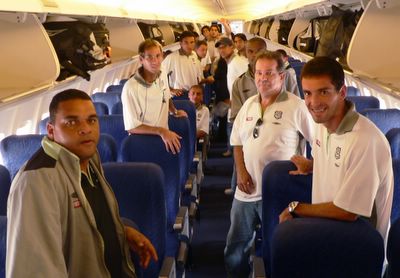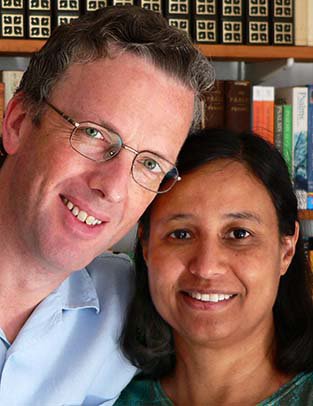Tuesday, May 30, 2006
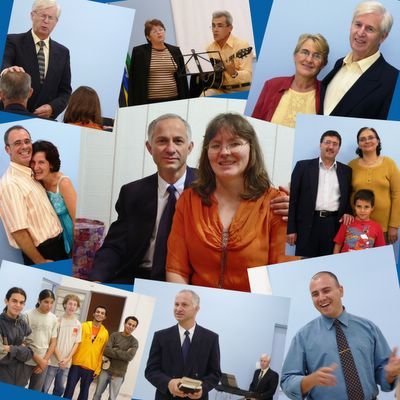
Jaraguá do Sul, 27 May 2006
On Saturday 27 March we visited Jaraguá do Sul for the induction of the new pastor, José. It was a great day, with much joy and yet strangely sad know that this has to be a key moment in the final chapters of Joe and Evelyn’s ministry. May God bless them, the Berian Baptist Church and Pastor José.
Wednesday, May 24, 2006
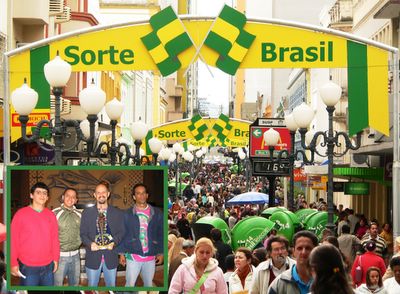
Winter is here - well, autumn anyway. Terribly cold - look - 16 celsius - and no Christmas to look forward to. But the World Cup is coming. Madness is already descending. The streets are being decorated: Good Luck, Brazil! You cannot watch 5 minutes of television without football being mentioned, and a replica of Our Lady Aparecida decorated with the national flag is being flown out to help the national side.
In the Peregrinos, interest is broad-based: we now have three teams in the cup - Brazil, England and ... Ghana. Solomon, our Pharmacy student from Ghana, will be behind his national team. Cora does not have the pleasure of seeing India play, so she will have to make do with supporting Brazil. Apparently they are not too bad - they may have a better chance than the rather weak team of 2002. Now, what happened to them...?
Thursday, May 18, 2006
May 2006 - The worst ever violence in São Paulo
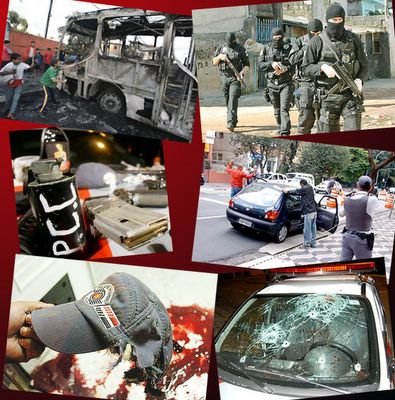
Well, just for once, and just for a couple of days, Brazilian violence made it to the news reports of the whole world. So you all know about the PCC and the organised attacks on the police and public structures in general. While Britain mourned the death of one police officer, São Paulo lost 23 in a night. We find the sense of shock and pain over the death of the one officer extremely moving, against the backdrop here. Everyone knows her name! Everyone feels violated! There is a sense of outrage that our protectors should be attacked. In a country where big cities can lose a policeman or two every day even at normal times, there is no such feeling.
In some ways the statistics of the worst days are not the most striking part: what got to me were two headlines after the worst was over.
SÃO PAULO PASSES A QUIET NIGHT
What followed described the night: only five buses burnt out, and 9 dead in shoot-outs with the police. Such is a quiet night.
POLICE KILL MORE IN TWO DAYS THAN NORMALLY IN TWO MONTHS
This headline with its ingenuous echoes of rainfall or production statistics says it all. You almost expect to see a sub-head, "We can do better still, says Police Chief". Here it is normal for bandits to kill police and for police to kill bandits. To make headlines even in Brazil there has to be a reasonable number of each.
What was so alarming was that, as the number of police deaths plummeted in this burst of violence, so the number of "bandit" deaths soared. What we were seeing was not self-defence - it was the settling of scores. The next news may well be a wave of deaths in the prisons, as the leaders of the rebellions are systematically taken out: that has certainly happened in the past.
And the worst thing is that many members of the public welcome all this. I commented on this aspect of the situation in our travel agency on Wednesday, and a number gave the reply, "but these are lives that we are better off without", "they are not worth letting live."
I happen to be in favour of capital punishment. But a policy of "shoot to kill" - and actually, "hunt to shoot to kill" - on the part of the police is murder. This is the absolute absence of any kind of concept of "the rule of law." This is to perpetuate a situation in which the Police are simply bandits in uniform. This is to lose sight of all human values: that is, this is to disconnect finally from any sense of God's image in my fellow man. It makes us groan inside, "Até quando, SENHOR?" (Ps 13:1)
Although this problem was a special one, localised (by and large) in São Paulo, the safety situation is certainly getting worse in all parts of the country. Intense debate is going on as to how to deal with the situation, including a rash of new legislation as a result of the PCC attacks. In an election year, the politicisation of the violence issue is inevitable, but the real issues are moral, not political. Honest politicians of both left and right are honest: corrupt politicans of either side are corrupt. And it is not new legislation that will change Brazil, but a new heart.
For that issue of corruption, of lack of integrity, is at the root of the whole problem. The Minister of Justice has said that the root of the whole PCC bloodbath is money laundering. But money laundering is just one aspect of the whole structure of the parallel economy, which is one aspect of the jeitinho brasileiro which always finds a "way", where the end is more important than the means, where comfort, not truth, is the ultimate criterion.
We sometimes wonder aloud, how can there be so little impact at a social level in a country where the evangelical church already includes 20% of the population and is still growing? There is something very seriously wrong with this church growth. There is something very seriously wrong with the church.
Where does the problem start? When businessmen routinely falsify the salary figures for their employees in order to reduce tax bills - and Christians do EXACTLY the same ... when a pastor can ask for a discount at the recent Colloquium conference, on the basis that he is only coming for one day... and then, having got his badge, attend every day... when three girls at the same event can say at the registration desk that they have spoken to the organisers and been promised a discount, when no such conversation has taken place ... when a "way" can always be found to pass students in the Bible Institute even when they have failed their exams ... when lack of integrity is so endemic in society that even evangelicals are corrupt without blinking ... when (Isaiah 59:14) justice is driven back, and righteousness stands at a distance; truth has stumbled in the streets, honesty cannot enter ... when these things rule, it is not surprising to find a great deal of blood in the same streets. The population as a whole and the church in particular recoils in horror from the bloodshed - but the population as a whole and the church in particular has the smoking gun in its hand every time it lies and participates in the general corruption.
A church which provides comfort but no challenge, which is all glory and no cross, which is all party and no mourning, which is all heart but carefully avoids the head and never troubles the conscience, which is man-centred and not God-centred, which plays fast and loose with the scriptures and has no sense of awe and of "Thus says the Lord" in the pulpit - such a church has no capacity to change society. The grizzly end point of such an "evangelical revival" may be a Ruanda, where Evangelical Christian Hutus and Evangelical Christian Tutsis hacked each other to death in the 90s.
And the start point is a pastor preaching something less than what the Bible says.
Please pray for Brazil.

Well, just for once, and just for a couple of days, Brazilian violence made it to the news reports of the whole world. So you all know about the PCC and the organised attacks on the police and public structures in general. While Britain mourned the death of one police officer, São Paulo lost 23 in a night. We find the sense of shock and pain over the death of the one officer extremely moving, against the backdrop here. Everyone knows her name! Everyone feels violated! There is a sense of outrage that our protectors should be attacked. In a country where big cities can lose a policeman or two every day even at normal times, there is no such feeling.
In some ways the statistics of the worst days are not the most striking part: what got to me were two headlines after the worst was over.
SÃO PAULO PASSES A QUIET NIGHT
What followed described the night: only five buses burnt out, and 9 dead in shoot-outs with the police. Such is a quiet night.
POLICE KILL MORE IN TWO DAYS THAN NORMALLY IN TWO MONTHS
This headline with its ingenuous echoes of rainfall or production statistics says it all. You almost expect to see a sub-head, "We can do better still, says Police Chief". Here it is normal for bandits to kill police and for police to kill bandits. To make headlines even in Brazil there has to be a reasonable number of each.
What was so alarming was that, as the number of police deaths plummeted in this burst of violence, so the number of "bandit" deaths soared. What we were seeing was not self-defence - it was the settling of scores. The next news may well be a wave of deaths in the prisons, as the leaders of the rebellions are systematically taken out: that has certainly happened in the past.
And the worst thing is that many members of the public welcome all this. I commented on this aspect of the situation in our travel agency on Wednesday, and a number gave the reply, "but these are lives that we are better off without", "they are not worth letting live."
I happen to be in favour of capital punishment. But a policy of "shoot to kill" - and actually, "hunt to shoot to kill" - on the part of the police is murder. This is the absolute absence of any kind of concept of "the rule of law." This is to perpetuate a situation in which the Police are simply bandits in uniform. This is to lose sight of all human values: that is, this is to disconnect finally from any sense of God's image in my fellow man. It makes us groan inside, "Até quando, SENHOR?" (Ps 13:1)
Although this problem was a special one, localised (by and large) in São Paulo, the safety situation is certainly getting worse in all parts of the country. Intense debate is going on as to how to deal with the situation, including a rash of new legislation as a result of the PCC attacks. In an election year, the politicisation of the violence issue is inevitable, but the real issues are moral, not political. Honest politicians of both left and right are honest: corrupt politicans of either side are corrupt. And it is not new legislation that will change Brazil, but a new heart.
For that issue of corruption, of lack of integrity, is at the root of the whole problem. The Minister of Justice has said that the root of the whole PCC bloodbath is money laundering. But money laundering is just one aspect of the whole structure of the parallel economy, which is one aspect of the jeitinho brasileiro which always finds a "way", where the end is more important than the means, where comfort, not truth, is the ultimate criterion.
We sometimes wonder aloud, how can there be so little impact at a social level in a country where the evangelical church already includes 20% of the population and is still growing? There is something very seriously wrong with this church growth. There is something very seriously wrong with the church.
Where does the problem start? When businessmen routinely falsify the salary figures for their employees in order to reduce tax bills - and Christians do EXACTLY the same ... when a pastor can ask for a discount at the recent Colloquium conference, on the basis that he is only coming for one day... and then, having got his badge, attend every day... when three girls at the same event can say at the registration desk that they have spoken to the organisers and been promised a discount, when no such conversation has taken place ... when a "way" can always be found to pass students in the Bible Institute even when they have failed their exams ... when lack of integrity is so endemic in society that even evangelicals are corrupt without blinking ... when (Isaiah 59:14) justice is driven back, and righteousness stands at a distance; truth has stumbled in the streets, honesty cannot enter ... when these things rule, it is not surprising to find a great deal of blood in the same streets. The population as a whole and the church in particular recoils in horror from the bloodshed - but the population as a whole and the church in particular has the smoking gun in its hand every time it lies and participates in the general corruption.
A church which provides comfort but no challenge, which is all glory and no cross, which is all party and no mourning, which is all heart but carefully avoids the head and never troubles the conscience, which is man-centred and not God-centred, which plays fast and loose with the scriptures and has no sense of awe and of "Thus says the Lord" in the pulpit - such a church has no capacity to change society. The grizzly end point of such an "evangelical revival" may be a Ruanda, where Evangelical Christian Hutus and Evangelical Christian Tutsis hacked each other to death in the 90s.
And the start point is a pastor preaching something less than what the Bible says.
Please pray for Brazil.
Sunday, May 14, 2006
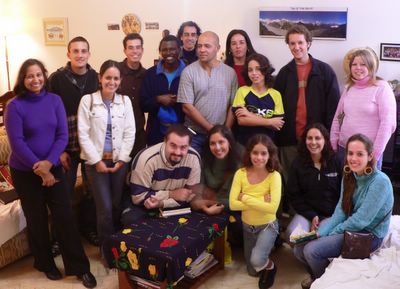
Sunday 14 May The Peregrinos
Unfortunately the picture was taken after Geraldo, Simone and Letícia had gone, but it demonstrates how the face of the church is changing. Our numbers are still small, and we reached an all-time low at Carnival, when Alberto and Elizete felt that they needed to join their three children at the Presbyterian Church in Trindade, the next neighbourhood. The Carnival Retreat was a crucial moment of stock-taking, reflection and prayer. At that time we took the decission to start meeting regularly in the same place - our own home, and to get much more pro-active and less idealistic in terms of growth and structure. And since then we have seen a great change in terms of mood and numbers with contact with the MEUNI group leading to a number of students entering into regular contact with us. Those who come have been attending just as regularly on Friday nights for prayer as on Sundays, and this has been a great encouragement. So please pray on for the Peregrinos - we feel that we are in the process of really becoming a church.

Saturday 13 May
Organisation of the new Congregation of the Independent Baptist Church, Serraria
Alexandre, one of our students who graduated last year, is leading a new church being planted by the Independent Baptist Church, Floresta, over on the continent. We were unable to attend this special occasion, because of a visit to Blumenau, but Alexandre's brother-in-law, Everton, sent us these photos. We are immensely encouraged by the progress Alexandre (in pulpit at right) is making, and his willingness to serve, alongside his wife, Andressa (blonde lady visible in two of the photos) and their children.
Andrew is due to preach in the mother church at Floresta this coming Sunday night.
A Tale of Two Adventists and Mark 2:1-22
She had started going to the Adventist church. And she was upset. “My father wants to throw me out” she said. “Why?” I said. “Because I have told him he is sinning when he eats pork.” “Ah,” I said. “What do you think is the basis for salvation – how can someone be saved?” She thought. “By keeping to the ways of the Lord,” she said. “That is where you need to rethink,” I said.
“Are all Adventists this far off?,” I wondered. The young lady who had recently started cleaning for us is an Adventist, and she certainly seemed to have a lively faith in Jesus. So, over lunch the next day, I put the same question to her. “What is the basis for your hope of salvation?” She looked me squarely in the eye. “Jesus,” she said. “Only Jesus – what he did on the cross. All my attempts to obey his law are only gratitude for what he did for me.”
I know that the Seventh Day Adventists are the most sect-like church, or the most Christian of the sects, and are heavily soaked in legalism. But I also know that the above conversations could be repeated with many denominations, here in Brazil. And that, although few would put the question in quite such stark terms, the same issue troubles us in Britain too.
How are we saved? It is all too easy for the world in its first contacts with our churches to get the impression that being good is what saves. And it is all too easy for us to give this impression because we live it. Even if we have begun well, seeing our lostness and throwing ourselves on God’s grace in Jesus, we end up “doing a Galatian” and living by works, trying to hold on to our sagging assurance by keeping the rules of our party.
When Jesus had his first bout of conflict with the Jewish leaders, it was over this point. They believed that God pardons. But they couldn’t believe that’s God pardon could come down to earth. There was no chance of total assurance of pardon. And when pardon becomes hypothetical, you are left with rule-keeping, in-crowd-pleasing, works religion.
And Jesus came, and said to a paralysed man, “Your sins are forgiven.” Just like that. And he showed he wanted to make a Habit of it, calling the Rome-loving tax-collector Levi to follow him, and then eating with Levi’s filthy, sinful crowd. And when the Pharisees objected he showed that his Habit was a Principle, saying that pardon for sinners was the heart of his mission. They didn’t like that: free pardon, without jumping through their hoops just wasn’t on, and they didn’t like the joy that characterised Jesus’ crowd; it seemed so cheap. Perhaps if Jesus had only insisted on a few of their rules; fasting, for instance…
But he made it very clear: his way and theirs were totally incompatible. You just couldn’t mix them. Chalk and cheese. Or worse – new wine in old skins – try to mix them and you lose both. Jesus’ grace and Pharisees’ works did not combine.
They still don’t. And it is still a big issue. The gospel of grace is constantly being swallowed up by our capacity to keep pardon at arms length and turn Christianity into rule keeping. When we do that, we destroy the possibility of conversion, and create sad people like the first young woman mentioned above. Because grace is the only gospel that saves!
(Written by Andrew for the UFM Worldwide Magazine Four Corners - used here by permission.)
She had started going to the Adventist church. And she was upset. “My father wants to throw me out” she said. “Why?” I said. “Because I have told him he is sinning when he eats pork.” “Ah,” I said. “What do you think is the basis for salvation – how can someone be saved?” She thought. “By keeping to the ways of the Lord,” she said. “That is where you need to rethink,” I said.
“Are all Adventists this far off?,” I wondered. The young lady who had recently started cleaning for us is an Adventist, and she certainly seemed to have a lively faith in Jesus. So, over lunch the next day, I put the same question to her. “What is the basis for your hope of salvation?” She looked me squarely in the eye. “Jesus,” she said. “Only Jesus – what he did on the cross. All my attempts to obey his law are only gratitude for what he did for me.”
I know that the Seventh Day Adventists are the most sect-like church, or the most Christian of the sects, and are heavily soaked in legalism. But I also know that the above conversations could be repeated with many denominations, here in Brazil. And that, although few would put the question in quite such stark terms, the same issue troubles us in Britain too.
How are we saved? It is all too easy for the world in its first contacts with our churches to get the impression that being good is what saves. And it is all too easy for us to give this impression because we live it. Even if we have begun well, seeing our lostness and throwing ourselves on God’s grace in Jesus, we end up “doing a Galatian” and living by works, trying to hold on to our sagging assurance by keeping the rules of our party.
When Jesus had his first bout of conflict with the Jewish leaders, it was over this point. They believed that God pardons. But they couldn’t believe that’s God pardon could come down to earth. There was no chance of total assurance of pardon. And when pardon becomes hypothetical, you are left with rule-keeping, in-crowd-pleasing, works religion.
And Jesus came, and said to a paralysed man, “Your sins are forgiven.” Just like that. And he showed he wanted to make a Habit of it, calling the Rome-loving tax-collector Levi to follow him, and then eating with Levi’s filthy, sinful crowd. And when the Pharisees objected he showed that his Habit was a Principle, saying that pardon for sinners was the heart of his mission. They didn’t like that: free pardon, without jumping through their hoops just wasn’t on, and they didn’t like the joy that characterised Jesus’ crowd; it seemed so cheap. Perhaps if Jesus had only insisted on a few of their rules; fasting, for instance…
But he made it very clear: his way and theirs were totally incompatible. You just couldn’t mix them. Chalk and cheese. Or worse – new wine in old skins – try to mix them and you lose both. Jesus’ grace and Pharisees’ works did not combine.
They still don’t. And it is still a big issue. The gospel of grace is constantly being swallowed up by our capacity to keep pardon at arms length and turn Christianity into rule keeping. When we do that, we destroy the possibility of conversion, and create sad people like the first young woman mentioned above. Because grace is the only gospel that saves!
(Written by Andrew for the UFM Worldwide Magazine Four Corners - used here by permission.)
Friday, May 12, 2006
Goiânia 29 April - 8 May
Second Symposium for Theological Reflection - Church of Christ, Novo Horizonte, Goiânia
The main purpose of our trip to Goiânia was to minister in this event run by the Bible Institute of the Church of Christ in Novo Horizonte, a suburb of Goiânia. Andrew preached twice on the Sunday at the church, and then gave two three hour sessions (with interval for wonderful soup!) on the Monday and Tuesday nights. The event was fairly well attended, and attention to the word was good. It was encouraging to reach a public rather different from that at the typical Encontro da Fé Reformada at First Presbyterian. There were many church leaders, principally from the Churches of Christ, Renewed Baptists, Assemblies of God and other more Pentecostal groupings. There was one couple from the Igreja Internacional da Graça; a strongly prosperity church, and they took careful notes of everything, as well as buying a CD of Andrew’s preaching in other places.
The theme was the centrality of Christ in all the scriptures. Rather than try to do a technical treatment of the subject in the limited time available, Andrew spoke from Luke 24, showing how Jesus himself saw all the scriptures (the three sections of the OT) as speaking of him. Then we looked at one or two representative passages from each section, with a tone more of “preach” than classroom. The ministry was well received.
The only worrying note was the bookstall – stocked with liberal volumes, with no Biblically oriented material in sight. It was very odd to preach in the tradition of conservative-evangelical biblical-theology and know that what was on the bookstall was basically poisonous. There is sometimes a tendency to flirt with this kind of thing without realising the damage it can do. Please pray about this.
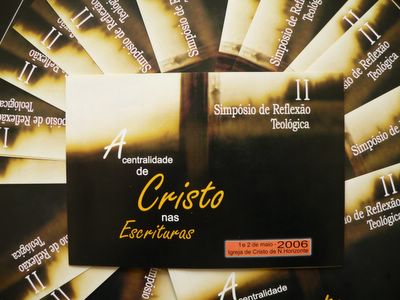
Publicity for the symposium.

Igreja de Cristo, Novo Horizonte, Goiânia.
On the one hand this church is a very typical Brazilian Evangelical church - full of life and energy. But some points are distinctive, reflecting the denominational background. The church has communion every Sunday night, with the people coming forward to participate. It was good.

Douglas, Director of the Training Institute at the Church of Christ, who organised the symposium.
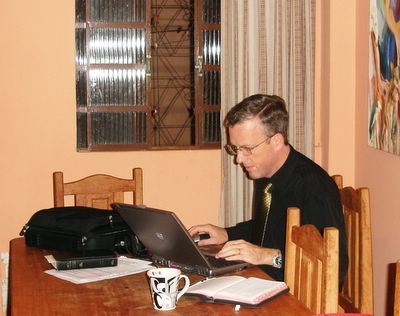
Andrew, in final preparations on the second night.
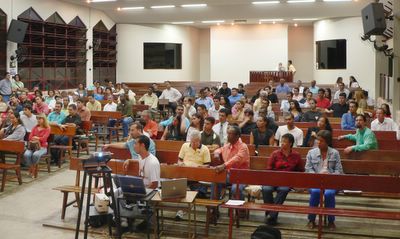
The crowd present for the two nights on "the Centrality of Christ in all the Scriptures."
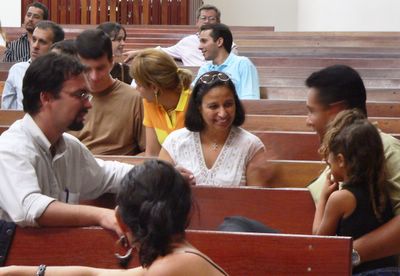
Interval - and good conversations.
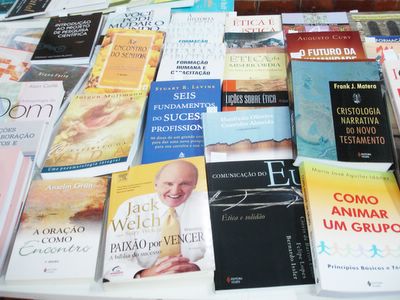
Bookstall - an odd mix, which even included "The Da Vinci Code".

Douglas selling copies of a CD with MP3 sermons - Exodus and Celebrating The Reformation.
Second Symposium for Theological Reflection - Church of Christ, Novo Horizonte, Goiânia
The main purpose of our trip to Goiânia was to minister in this event run by the Bible Institute of the Church of Christ in Novo Horizonte, a suburb of Goiânia. Andrew preached twice on the Sunday at the church, and then gave two three hour sessions (with interval for wonderful soup!) on the Monday and Tuesday nights. The event was fairly well attended, and attention to the word was good. It was encouraging to reach a public rather different from that at the typical Encontro da Fé Reformada at First Presbyterian. There were many church leaders, principally from the Churches of Christ, Renewed Baptists, Assemblies of God and other more Pentecostal groupings. There was one couple from the Igreja Internacional da Graça; a strongly prosperity church, and they took careful notes of everything, as well as buying a CD of Andrew’s preaching in other places.
The theme was the centrality of Christ in all the scriptures. Rather than try to do a technical treatment of the subject in the limited time available, Andrew spoke from Luke 24, showing how Jesus himself saw all the scriptures (the three sections of the OT) as speaking of him. Then we looked at one or two representative passages from each section, with a tone more of “preach” than classroom. The ministry was well received.
The only worrying note was the bookstall – stocked with liberal volumes, with no Biblically oriented material in sight. It was very odd to preach in the tradition of conservative-evangelical biblical-theology and know that what was on the bookstall was basically poisonous. There is sometimes a tendency to flirt with this kind of thing without realising the damage it can do. Please pray about this.

Publicity for the symposium.

Igreja de Cristo, Novo Horizonte, Goiânia.
On the one hand this church is a very typical Brazilian Evangelical church - full of life and energy. But some points are distinctive, reflecting the denominational background. The church has communion every Sunday night, with the people coming forward to participate. It was good.

Douglas, Director of the Training Institute at the Church of Christ, who organised the symposium.

Andrew, in final preparations on the second night.

The crowd present for the two nights on "the Centrality of Christ in all the Scriptures."

Interval - and good conversations.

Bookstall - an odd mix, which even included "The Da Vinci Code".

Douglas selling copies of a CD with MP3 sermons - Exodus and Celebrating The Reformation.
Igreja Batista Renovada
Through the event at the church of Christ, Andrew received invitations to speak at churches of other denominations, and ended up speaking three times at two Renewed Baptist Churches.
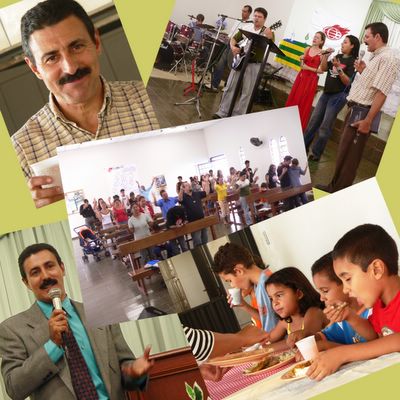
Renewed Baptist Church, Novo Horizonte. Pastor Wilson is seen here (top and bottom left) with photos of the meeting and church lunch on Bank holiday Monday, 1st May.
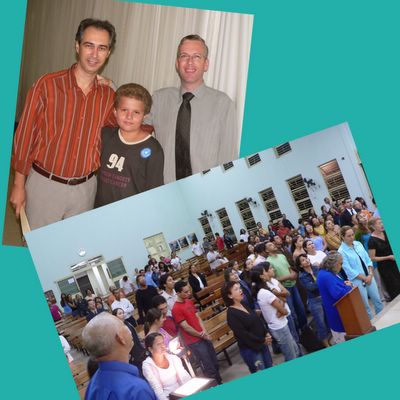
On the Wednesday night, Andew preached at the Filadélfia Renewed Baptist Church. It is lovely to be in a congregation of 120 at a midweek meeting, and better still when the attention to the Word is so quiet and careful. At top left, Andrew with Pastor Eder and his son.
Through the event at the church of Christ, Andrew received invitations to speak at churches of other denominations, and ended up speaking three times at two Renewed Baptist Churches.

Renewed Baptist Church, Novo Horizonte. Pastor Wilson is seen here (top and bottom left) with photos of the meeting and church lunch on Bank holiday Monday, 1st May.

On the Wednesday night, Andew preached at the Filadélfia Renewed Baptist Church. It is lovely to be in a congregation of 120 at a midweek meeting, and better still when the attention to the Word is so quiet and careful. At top left, Andrew with Pastor Eder and his son.
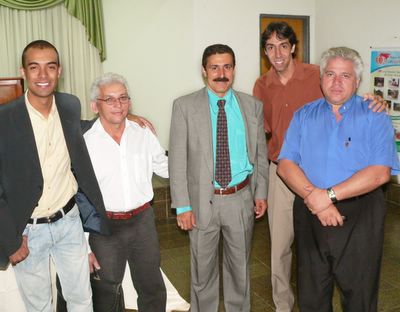
The strangest thing...
About ten minutes into the Sunday night meeting at the Novo Horizonte Renewed Baptist Church, a man came in and spoke to the pastor. His blue shirt, clerical collar and smart little brief-case announced him as a Padre, a catholic priest. He went with the Pastor to the vestry (appropriate name, for once) emerging shortly thereafter dressed in full priestly robes. Please do not ask for more details – I do not know a chasuble from a chancel, having been brought up in pure SB circles with no bad habits. What he was wearing is generally called a batina here, and was to say the least an unusual sight in a small neighbourhood Baptist church.
The effect on the congregation was interesting. You could feel the tension. I was going to preach, so was more than a little interested, but didn’t have a clue as to whether this was an ecumenical move on the pastor’s part which could be difficult to handle. Edomm, further down our pew, had the same thought, leaning over to say, “If he leads communion, I am out of here.”
Then the pastor called me over and out to the vestry, together with the priest. “This is Father José. God is working in his life. He was passing this church on the way to take mass in a home and he felt he had to come in and give up the priesthood for ever. He has asked if he may use the batina one last time, taking it off at the end of the service.”
I didn’t say much. We went back in. We had communion. The pastor gave a robust word about “believers in good standing with an evangelical church” and the deacons did not offer the bread or wine to the priest. We were a bit keyed up and ate the bread at the wrong moment.
I preached. Padre José did not have a Bible. Cora offered him one. He refused. He looked at his watch and shuffled throughout the sermon, while the congregation sat, extremely quiet (little of the usual Glória a Deus! and Alleluia!) and attentive. I was conscious that many were praying, for me and for the priest. I preached on the three moments when Jesus tells us why he came, in Mark.
At the end, the pastor prayed. Father José came forward, took off the batina and clerical collar, and the pastor prayed for him. There was no particular emotion, except for a number of ladies from the church who thought it was all wonderful.
There was a lot of conversation with the José after the service, and I took a photo. He is apparently living a little out of town, in a shack on a small holding, together with a bishop and another priest. All want to leave the Roman Catholic Church. At the time of writing, Pastor Wilson has been taking them food and (possibly) money.
What should we think? This may have been a wonderful moment of spiritual transformation. It may have been a piece of theatre. Even to write these two sentences side by side is painful, but it must be done.
Thankfully, Pastor Wilson is not a fool. I know that he was cautious on the Sunday night, but not wanting to deny what might be of the Spirit. I am telling the story as it happened because it is such a good example of evangelical life here.
1) Anything can happen. Think of a crazy thing, and treble it.
2) God is doing wonderful things, saving people from all backgrounds. How glad and thankful we should be!
3) There is no limit to the fraud and deceit within the church, and the fact that with the inequalities present in the society, it is perfectly possible to make a living off the church, in many ways.
4) Telling the difference is often very hard.
5) Saying that you are not sure and that we need discernment is also hard. Brazil was post-modern before anywhere else, because here everything has to be cuddly and positive and nice – and asking tough questions is not on the agenda.
Please pray for José. Please pray for Pastor Wilson, and for Edomm, who may be discipling the three in the shack. And pray for an open spirit combined with discernment, without which the Brazilian evangelical church is doomed.
29 April - 3 May: Home of Waldomiro de Deus and Lourdes de Deus
We arrived in Goiânia to be greeted at the airport by Douglas (from the Church of Christ) together with a young guy called Edom. We were to stay at his home. Just before leaving the car, Douglas said that we would find the home rather "different" - Edomm's father being an artist with a strong line in vivid story telling. Douglas was not exaggerating.
Waldomiro de Deus is a naïve painter with a career spanning four decades, exhibitions in several countries and all over Brazil. He is a Pentecostal believer, having been converted while in Jerusalem, at the height of the hippy era. The house is full of original art works: his own, those of his wife Lourdes, and those of friends from the Brazilian art world. (Full means that even the bathrooms each feature several original canvasses.) His work and something of his life (in eccentric English translation) can be seen here. His themes range between the Biblical, the everyday, and the corruption of governments and destruction of the environment.
Lourdes de Deus has a style reminiscent of Lowry: busy pictures, showing many aspects of Brazilian life and culture. Sadly she was not at home during our visit; she was taking care of an exhibition in São Paulo.
For us the experience of staying in Waldomiro’s home, and to meet his family, was a great joy, and really different, just as Douglas had said. Edom was a very close companion, practical help and encourager throughout the week. I hope we meet him and his family again.
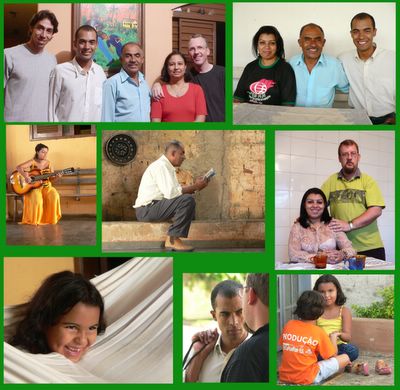
Waldomiro de Deus and family. Waldomiro is the older man who apears several times. Edomm is at the extreme top right, and other places. His sister Rebeca is seen with her husband José Luis, and daughter Cecília also appears.
A House Full of Art
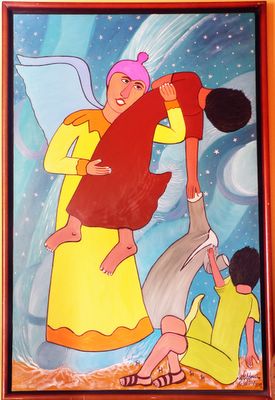
Elijah's ascent into heaven.
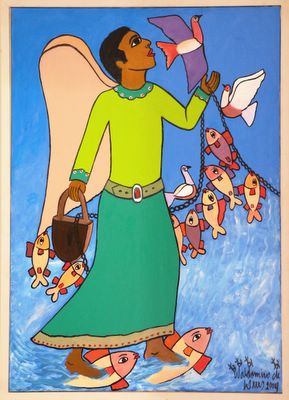
An apocalyptic or apocryphal theme? Someone help me.
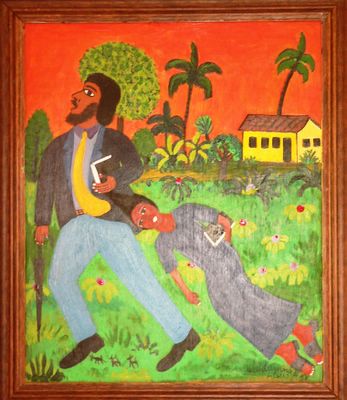
Marital tensions over church affiliation. "Where shall we attend, my dear?" Both are believers, as we can see by the Bible, but his beard and her long skirt may indicate that he is the presbyterian, she the pentecostal.
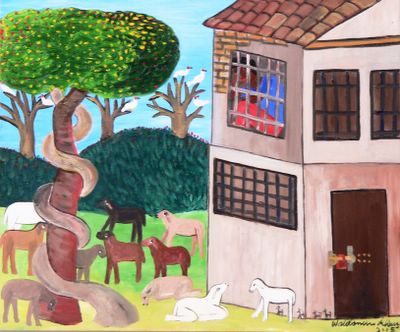
A prisoner weeps in his cell, as he sees the tree and creeper that has grown up so freely in the twenty years of his incarceration.
Works of Lourdes de Deus
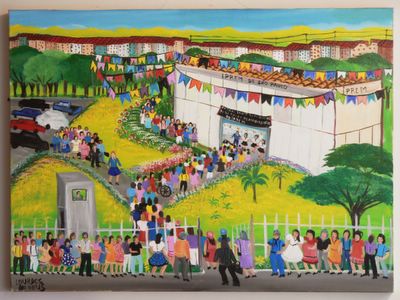
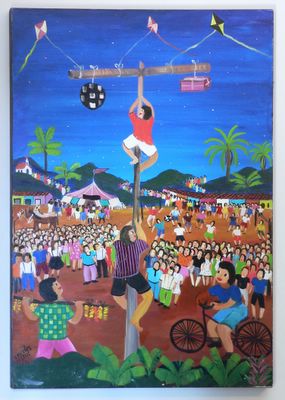

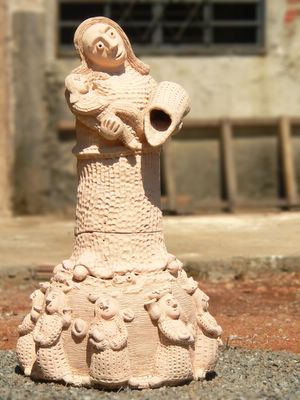
The house and garden also contain other original works by artists who are friends of the family.
We arrived in Goiânia to be greeted at the airport by Douglas (from the Church of Christ) together with a young guy called Edom. We were to stay at his home. Just before leaving the car, Douglas said that we would find the home rather "different" - Edomm's father being an artist with a strong line in vivid story telling. Douglas was not exaggerating.
Waldomiro de Deus is a naïve painter with a career spanning four decades, exhibitions in several countries and all over Brazil. He is a Pentecostal believer, having been converted while in Jerusalem, at the height of the hippy era. The house is full of original art works: his own, those of his wife Lourdes, and those of friends from the Brazilian art world. (Full means that even the bathrooms each feature several original canvasses.) His work and something of his life (in eccentric English translation) can be seen here. His themes range between the Biblical, the everyday, and the corruption of governments and destruction of the environment.
Lourdes de Deus has a style reminiscent of Lowry: busy pictures, showing many aspects of Brazilian life and culture. Sadly she was not at home during our visit; she was taking care of an exhibition in São Paulo.
For us the experience of staying in Waldomiro’s home, and to meet his family, was a great joy, and really different, just as Douglas had said. Edom was a very close companion, practical help and encourager throughout the week. I hope we meet him and his family again.

Waldomiro de Deus and family. Waldomiro is the older man who apears several times. Edomm is at the extreme top right, and other places. His sister Rebeca is seen with her husband José Luis, and daughter Cecília also appears.
A House Full of Art

Elijah's ascent into heaven.

An apocalyptic or apocryphal theme? Someone help me.

Marital tensions over church affiliation. "Where shall we attend, my dear?" Both are believers, as we can see by the Bible, but his beard and her long skirt may indicate that he is the presbyterian, she the pentecostal.

A prisoner weeps in his cell, as he sees the tree and creeper that has grown up so freely in the twenty years of his incarceration.
Works of Lourdes de Deus




The house and garden also contain other original works by artists who are friends of the family.
Colloquium Conference 3-6 May
The First Colloquium Conference was a great joy and stimulus. There was, in effect, one speaker, Dan Doriani, who worked his socks off. We loved the fact that much space was given to the consecutive exposition of one book of the Bible: James, opened up with a tremendous eye for the big picture. We have never seen that done in a conference in Brazil: we speak a lot about the importance of exposition, but do very little in our conferences. Alongside James, in the morning expositions, Dan gave us an assortment of tips and helps for preaching Christ in all the scriptures: a great help to many, though for us very much the norm of what we teach week in and week out. And in the evenings he opened up the theme of the family - biblical, practical, easy to hear and yet courageous and strong.
With Dan came his wife Debbie, who we came to appreciate and love instantly. It was also a joy to get to know Randy and Sharon Mayfield. Randy is Musical Director at the Central Presbyterian Church, St Loius, Missouri, where Dan is Senior Pastor. He sang in all the meetings (in English, sometimes with a brief explanatory word before the song) and gave a workshop on Christian music.
With a first event of this kind, there are always teething troubles and adjustments to be made, but here was a great start, and we enjoyed the conference very much. The impact of a few days hearing the Word was good. It was good even to hear things we know well, but which are so desperately needed here, and to which people sometimes react badly. The confirmation and encouragement that we are not alone in this work, and that these truths are of universal validity, was a great encouragement.
One other aspect: for obvious reasons, this wasn't the best week to spend much time with Luciano and Luciene Pires, founders of Colloquium and organizers of the conference. But it was a week where we felt even more drawn to them and to their ministry: the work of Colloquium is even closer to the heart of what we are trying to do than we knew. Please pray for them, and for us in this: Andrew has now accepted to be part of the advisory council of Colloquium, and though this will not be onerous, we want to take it seriously.
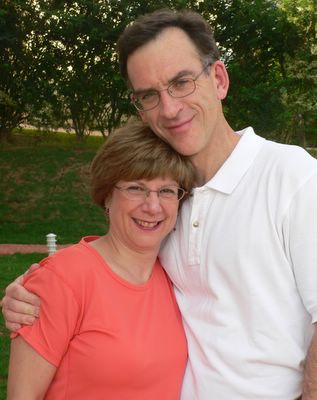
Dan and Debbie Doriani

Randy and Sharon Mayfield

Dan Doriani in action, with interpreters Luciano Pires and Mauro Meister (bearded.)

Randy Mayfield's contribution to the music, and to thinking about music, was appreciated.
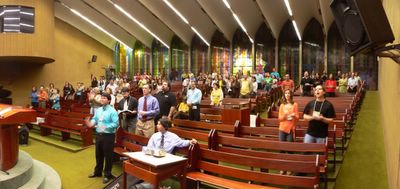
Congregation on the final night.
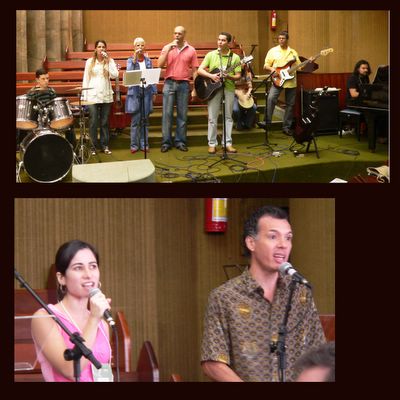
Music did not dominate the conference, but as ever at First Presbyterian, it was varied, theological coherent and of good quality.
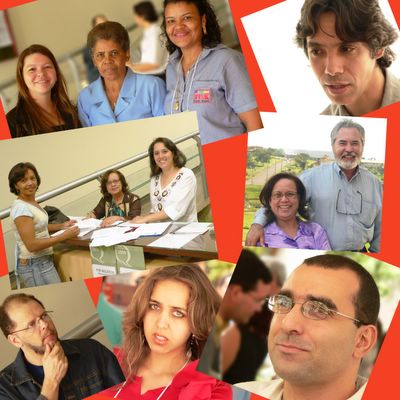
Of course, the number of people who work in such an event, contributing in one way or another, is enormous. Here are a few...
The First Colloquium Conference was a great joy and stimulus. There was, in effect, one speaker, Dan Doriani, who worked his socks off. We loved the fact that much space was given to the consecutive exposition of one book of the Bible: James, opened up with a tremendous eye for the big picture. We have never seen that done in a conference in Brazil: we speak a lot about the importance of exposition, but do very little in our conferences. Alongside James, in the morning expositions, Dan gave us an assortment of tips and helps for preaching Christ in all the scriptures: a great help to many, though for us very much the norm of what we teach week in and week out. And in the evenings he opened up the theme of the family - biblical, practical, easy to hear and yet courageous and strong.
With Dan came his wife Debbie, who we came to appreciate and love instantly. It was also a joy to get to know Randy and Sharon Mayfield. Randy is Musical Director at the Central Presbyterian Church, St Loius, Missouri, where Dan is Senior Pastor. He sang in all the meetings (in English, sometimes with a brief explanatory word before the song) and gave a workshop on Christian music.
With a first event of this kind, there are always teething troubles and adjustments to be made, but here was a great start, and we enjoyed the conference very much. The impact of a few days hearing the Word was good. It was good even to hear things we know well, but which are so desperately needed here, and to which people sometimes react badly. The confirmation and encouragement that we are not alone in this work, and that these truths are of universal validity, was a great encouragement.
One other aspect: for obvious reasons, this wasn't the best week to spend much time with Luciano and Luciene Pires, founders of Colloquium and organizers of the conference. But it was a week where we felt even more drawn to them and to their ministry: the work of Colloquium is even closer to the heart of what we are trying to do than we knew. Please pray for them, and for us in this: Andrew has now accepted to be part of the advisory council of Colloquium, and though this will not be onerous, we want to take it seriously.

Dan and Debbie Doriani

Randy and Sharon Mayfield

Dan Doriani in action, with interpreters Luciano Pires and Mauro Meister (bearded.)

Randy Mayfield's contribution to the music, and to thinking about music, was appreciated.

Congregation on the final night.

Music did not dominate the conference, but as ever at First Presbyterian, it was varied, theological coherent and of good quality.

Of course, the number of people who work in such an event, contributing in one way or another, is enormous. Here are a few...
3-8 May - Fausto and Ana-Laura's home, Aldeia do Vale
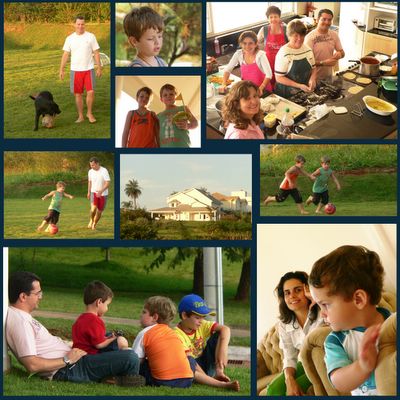
While at the Colloquium Conference, we stayed with Fausto and Ana-Laura and their sons, whom we have got to know over the last three or four visits to the city. They have recently moved to the Aldeia do Vale, a "closed condominium" development on the outskirts of the city noted for the beauty of the surroundings and for its ecological approach to maintenance. (For snake and pest control there are free-roaming emus, for example.) So the days with them were delightful for a quick blast of life with a young family, for rest (because Andrew wasn't preaching at the conference) and for walks with wildlife all around.
Emus.

Life goes on at the Aldeia do Vale. People do their thing, and the emus do theirs. You can tell who is visiting, because they actually take notice of the birds, and even photograph them. The emus ignore all the people equally.

A Capped Heron (Garça real) I think

On my first day of my first visit to Brazil in 1997 I was being driven to visit a construction site in São José dos Campos when I saw a Burrowing Owl. Owls that are out in the day time were a novelty for me, as were owls this small, this cute and this owlish. We have seen them in many places since, but never in such abundance as in the grass verges and parkland of the Aldeia do Vale. Most of these shots were taken in late afternoon sun.

This full scale defensive display was quite alarming, to say the least. These owls are not large, but can make themselves so!

A yet to be identified humming bird feeding a few yards from Fausto and Ana-Laura's home.

Spiders The orb-web spider at lower left was taken with the moon for background. What looks like a brown British house-spider on the right is actually the dreaded Brazilian Brown Spider, which lurks in wardrobes, and in clothes and shoes in wardrobes, ready to give a bite to blow your arm up like a football or even (so they say) kill are small or weak person. In six years, it is the first time we have seen one.

While at the Colloquium Conference, we stayed with Fausto and Ana-Laura and their sons, whom we have got to know over the last three or four visits to the city. They have recently moved to the Aldeia do Vale, a "closed condominium" development on the outskirts of the city noted for the beauty of the surroundings and for its ecological approach to maintenance. (For snake and pest control there are free-roaming emus, for example.) So the days with them were delightful for a quick blast of life with a young family, for rest (because Andrew wasn't preaching at the conference) and for walks with wildlife all around.
Emus.

Life goes on at the Aldeia do Vale. People do their thing, and the emus do theirs. You can tell who is visiting, because they actually take notice of the birds, and even photograph them. The emus ignore all the people equally.

A Capped Heron (Garça real) I think

On my first day of my first visit to Brazil in 1997 I was being driven to visit a construction site in São José dos Campos when I saw a Burrowing Owl. Owls that are out in the day time were a novelty for me, as were owls this small, this cute and this owlish. We have seen them in many places since, but never in such abundance as in the grass verges and parkland of the Aldeia do Vale. Most of these shots were taken in late afternoon sun.

This full scale defensive display was quite alarming, to say the least. These owls are not large, but can make themselves so!

A yet to be identified humming bird feeding a few yards from Fausto and Ana-Laura's home.

Spiders The orb-web spider at lower left was taken with the moon for background. What looks like a brown British house-spider on the right is actually the dreaded Brazilian Brown Spider, which lurks in wardrobes, and in clothes and shoes in wardrobes, ready to give a bite to blow your arm up like a football or even (so they say) kill are small or weak person. In six years, it is the first time we have seen one.
Presbyterian Congregation, Balneário
Our second Sunday nmorning was spent with the congregation of Fisrt Presbyterian that meets in Balneário, on the outskirts of the city. It was very encouraging to see this little church plant, well provided for by the mother church, in terms of building and other help, and about to "bud off" as an independent church. We already knew Pastor Hélio and his wife Edneia; meeting their family and the whole church was good too.

Notice board
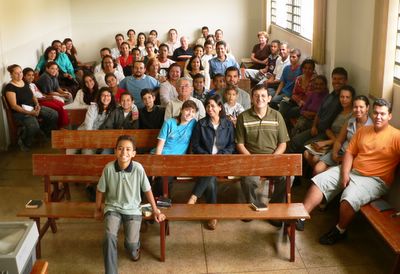
Sunday morning congregation. Rapt attention for Romans 3 - righteousness from God!

Pastor Hélio with his family
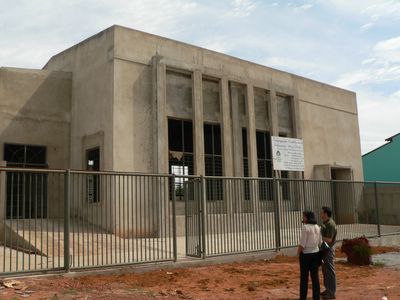
The excellent new building, nearing completion

Interior.
Our second Sunday nmorning was spent with the congregation of Fisrt Presbyterian that meets in Balneário, on the outskirts of the city. It was very encouraging to see this little church plant, well provided for by the mother church, in terms of building and other help, and about to "bud off" as an independent church. We already knew Pastor Hélio and his wife Edneia; meeting their family and the whole church was good too.

Notice board

Sunday morning congregation. Rapt attention for Romans 3 - righteousness from God!

Pastor Hélio with his family

The excellent new building, nearing completion

Interior.
